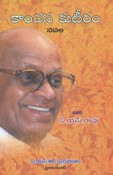 Telugu: Chinta Penta Satyanarayana Rao (C S Rao)
Telugu: Chinta Penta Satyanarayana Rao (C S Rao)
Sri CS Rao ((20 December 1935 – 14 April 2020) brings out the irony in this gripping narrative.]
That was a summer evening. The sun had set but the wind was still blowing hot. Sarmaji, the founder of Abhyudaya Nataka Samiti (ANS), a drama company, was busy writing production notes for a new play on the floor of rehearsal Hall. Four actors of ANS were engaged in gossip at a low pitch not to disturb his concentration.
Sarmaji was the director and producer of the play. He was a man of social consciousness and progressive ideas… and a man committed to employ drama as a medium to remove the evils and superstitions prevalent in the society. He strongly believed that drama is a powerful tool that could kindle humaneness in people and make them think responsibly. He has been serving this branch of art for the last twenty years sincerely. He was a synonym for discipline. He trained many artists, some of whom became famous later. Of course, that was an endless flow… people leaving- some unable to put up with his discipline, a few finding better opportunities, and others finding no avenues, and the new aspirants replacing the old.
Sarmaji’s ANS was a perennial flow. New flood pushing out the stagnant water is aa characteristic of a flow.
And the new stream with him now consisted of the four chatting there. They were Prakash, the hero of the play, Tambu, the comedian, Nagaraj, the villain and Chitti Babu, hero’s father.
The fact of the matter was, these four did not come to Sarmaji out of any devotion to acting. That was merely a pastime for them. Chitti Babu turned up here because his wife was at her father’s place for delivery. Prakash, the hero, had different ambitions. He knew Sarmaji was a renowned director and producer, and rich and high-society people would turn up for his plays. His idea was to use this stage to develop contacts with those people who could catapult him on to the silver screen. Nagaraj was a man who goes with the mob.
No matter what the intentions of his artists were, Sarmaji’s only aim was to present a good production on the stage. He never compromised on that matter.
“What is the time?” Sarmaji asked without lifting his eyes off from his production notes.
“Six ten,” replied Tambu.
“She said she would be here by six. Why did she not turn up yet?” he said, closing the book.
“Why would she turn up?” commented Nagaraj.
“What do you mean?” replied Sarmaji.
“You give undue respect to these heroines addressing them as ‘dear girl,’ or ‘dear mother!’ and they wag their tail,” replied Nagaraj.
Sarmaji did not relish his reply. “Civility begets civility,” he said and kept quiet.
He was equally worried that Lata, the heroine did not turn up on time.
Another five minutes passed.
Looking into his watch, Chitti Babu commented, ‘It is six fifteen. Time for the first show to begin.”
“Do you have any plans for going to a movie?” Sarmaji enquired.
“No. No. It’s not me. I was just thinking that Lata might have gone,” he explained.
“How could she do that? Acting is a pastime for us. But it is a means of livelihood for her. She might have gone to another rehearsal. She might have been delayed there and has become late coming here,” said Sarmaji.
“You are spoiling them by putting in so much trust,” said comedian Tambu.
Sarmaji looked seriously into the eyes of Tambu. He turned his looks elsewhere.
“It is past six thirty, sir! She will not turn up,” declared Chitti Babu.
“What makes you so confident?” asked Sarmaji impatiently.
“You dislike people when they speak the truth. That is why people are afraid to tell you the truth,” said Chitti Babu.
“Then why don’t you tell me the truth?” asked Sarmaji harshly.
“Chitti Babu is a timid creature, sir! What he means is that Lata might have gone to a movie with Madhu Babu!” said Tambu, sarcastically.
Hero Prakash guffawed.
“I don’t understand what you say. Tell me clearly,” asked Sarmaji.
Laughing ridiculously, Nagaraj said, “You have been in the field for the last twenty years. But what an innocent person you are! What he means is that Lata might have had a viable bargain than our rehearsal.”
“What do you mean by getting a ‘viable bargain’?”
“That is exactly what it is. Madhu Babu has started a new production company. He is now busy with rehearsals of the latest drama. His wife is in hospital suffering from some serious illness. He is rolling in money. Lata is within his reach. And to tell you more clearly…” Sarmaji interjected what Chitti Babu was going to say further.
“What is this nonsense. Is it fair to talk like this about a lady working with us? For that matter, it is bad to speak about anybody who is not present here. Lata is not such a lady,” Sarmaji said firmly.
Exactly at that moment Lata entered, and overhearing that they were talking about her, she refrained from entering in and waited outside anxious to hear what they were saying about her.
“Sir! You know Lata only as an artist. But she is smarter than that. Stage is a sanctum sanctorum for you. But it is a catwalk for her. She is in the prime of her youth. She wants to make best use of it before it withers away,” commented Prakash.
“Well said. What is the remuneration she gets after all, for a character on the stage? Mere hundred rupees. But it is incumbent on her to attend rehearsals for one month for that hundred. Whereas, if she spends a day with a man like Madhu Babu, she could anyway get that hundred, and additional income for the night,” said Tambu.
“Please stop it!” Sarmaji could not resist that frivolous talk anymore, “let us begin the rehearsal,” he said.
All of them stood up.”
“Without heroine…” Prakash murmured.
“I will be acting as a dummy for her,” Sarmaji vented his disgust.
“You! You play dummy for the heroine? How could he get inspiration to act, sir? He needs to caress her cheeks; and you have a rough beard,” commented Tambu looking at Prakash with pity.
“Ok. Let us rehearse only those scenes where his presence is not needed,” said Sarmaji.
After finding them getting ready with all seriousness, Lata walked in, apologizing, “I am sorry, sir! I am late.”
The four who spoke so ill of her in her absence started treating her with all respect once she stepped in.
“Please take a cup of coffee first,” said one.
“Oh! You are sweating so profusely? Did you come on foot? You should have taken a rickshaw,” said another.
“Is it the time for coffee? Please order a cool drink or Horlicks. She looks tired,” said Prakash, the hero.
“No, thank you. A glass of water is enough. Come on, get up. Let us begin the rehearsal!” Lata said, putting on a smiling face.
The rehearsal commenced.
It went on with all seriousness for one hour. Prakash reeled out phrases about the injustice being done to the women in society, how the same mistake is condoned in man but condemned in woman. Prakash and Lata acted the events wonderfully.
Drying her tears, a consequence of events of the play, Lata requested Sarmaji, “Sir! Permit me to leave early for today.”
“Okay, madam! But please try to be here on time tomorrow.”
“That is the problem with heroines. They come late but want to leave early,” said Tambu.
“The exemption is only for today,” said Lata.
She stopped for a moment lost in thought. She made a quick decision. Addressing fellow actors she said,
“I have a small question. You can give answers of your choice. Sarmaji is exempt. I know he will answer it easily,” she said.
“You can shoot your question,” said Prakash.
“Why answer only one? If you ask, we are ready to answer a hundred,” said Tambu.
“No oral answers. I will ask you a question. You can give the best answer you can think of. You must put it on paper. No consultations among yourselves. What I mean is, you should not copy from others,” said Lata.
“Do you think we are college students for copying? We are gentlemen. Come on, give us paper,” said Nagaraj coming forward.
Lata tore a paper into four pieces and gave them one each.
“Here is the question: Put down the names of two virtuous wives you are familiar with. Hear me clearly once again. I ask for the names of two virtuous wives you are familiar with.”
“Oh! After all this!” they exclaimed in unison.
“Yes, but don’t speak out. Put it on paper,” reiterated Lata.
Sarmaji was lost in thoughts about the import of that question. He was sure it was not as simple as it was apparent.
The four actors scribbled their answers.
“Shall I read out?” asked Prakash.
“Please go ahead,” replied Lata.
“Arundhati and Anasuya,” read out Prakash.
A gentle laugh passed over her lips.
“Why are you laughing? Are they not virtuous?” asked Prakash.
“Who am I to deny that?” replied Lata.
“Damayanti- Chandramati,” read out Nagaraj.
“So, you have selected the queens,” said Lata.
They were popular virtuous women,” argued Nagaraj.
“True! That is why people penned great works on them long after,” said Lata turning her attention towards Chitti Babu.
“Sita and Savitri,” he said.
This time she could not restrain her laughter anymore.
“What’s wrong with you? What makes you laugh so wildly? Don’t you know that they are all renowned virtuous women? I don’t understand why you belittle them?” said Chitti Babu in exasperation.
“Why would I denigrate those Virtuous women? What are they! And what am I? Mr. Tambu, what is your choice?”
“Draupadi and Ahalya,” read out Tambu.
This was the ultimate. She burst into sidesplitting laughter.
‘I know… you are laughing at my choice of Draupadi because she was polyandrous and Ahalya, was supposed to have been seduced by Indra.
“But you must bear in mind that they proved themselves to be virtuous and our Puranas attest it. If we deny that, don’t you think there will be an uproar?” asked Tambu.
“I did not laugh because your choices were wrong. What I asked you was to write the names of Virtuous women you are familiar with. You know none of these Virtuous women. They are the names you read or heard about. That was the reason for my laughter. I must pity your ignorance and innocence. Look! There are your mothers, your wives whom you married with God of Fire as witness, your own sisters, and your daughters who share your DNA. But none of them you qualified as virtuous. Can’t you deign any of them being virtuous?” asked Lata very emotively.
The four went pale.
Sarmaji was overwhelmed with joy for her smartness.
“When you cannot acknowledge your own mothers, wives, sisters, and daughters as virtuous, how could you acknowledge a fellow actress being virtuous? I don’t feel bad about whatever you say about me on my back. Bye!”
After taking a step forward, she turned back and said, “By the way, I forgot to tell you. Do you remember a ten-year-old girl that used to accompany me every day for the rehearsals? You all did see her. I introduced her as my sister to you all: she was not my sister. She was my own daughter. I lied to you because I was afraid that you would renege on offering me the heroine’s role for having a ten-year-old daughter. I taught her to lie and call me as her sister. That girl died this morning. She had a father, but he did not deserve the honor of being acknowledged as such in public. I became the father and mother to her. Her burial took a little longer than expected and I turned up late for the rehearsal! See you!” she said bidding goodbye.
Bleared with tears, Sarmaji’s eyes did not see a Lata in her.
They did not see an artist in Lata!
They did not see a woman in Lata!!
They saw a mother in her!!!
*
[Chakrapani Award Winning Story. First published in the October 1978 issue of Yuva]








Add comment